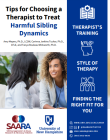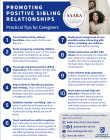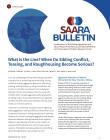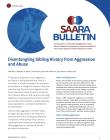Sibling aggression and abuse can be devastating, often leading to long-lasting impacts that extend far beyond childhood. These include:
- Breakdown of Trust and Safety: Sibling aggression and abuse shatter a sense of trust and safety within a family unit.
- Disruption of Family Dynamics: The presence of sibling aggression and abuse can create an environment of constant tension, fear, and conflict.
- Parental Strain and Guilt: Parents and caregivers may feel torn between their children, unsure of how to protect one child without alienating another. The guilt and helplessness parents experience can further damage other family relationships.
- Long-Term Impacts: The impacts of sibling aggression and abuse can persist into adulthood, affecting immediate family members and future generations. Survivors may struggle with depression, anxiety, PTSD, and relationship difficulties, making it challenging for them to form healthy relationships later in life.
- Sibling Estrangement: Sibling aggression and abuse can lead to long-term or permanent estrangement between siblings. This estrangement can extend to parents as well, especially if the harmed sibling feels their parents failed to protect them. Family gatherings, holidays, and other significant life events can become sources of stress and conflict for all.
- Cyclical Violence: If sibling abuse isn’t stopped, it can perpetuate a cycle of violence within families. Children who experience sibling aggression or abuse are at higher risk of engaging in aggressive behaviors in other relationships, including with peers, romantic partners, and their children.
What Can Parents and Caregivers Do?
Research shows that parents play a key role in preventing sibling aggression and abuse and promoting positive sibling relationships. Parents and caregivers can help by becoming familiar with the differences between sibling rivalry, conflict, aggression, and abuse, and by learning strategies to encourage constructive conflict. Learn More
Specific parenting practices are linked to warmer, closer, and less aggressive sibling relationships. There are several simple strategies caregivers can use to help siblings develop positive relationships and foster a positive family environment. Learn More
Several cost-effective, evidence-based parenting programs can help parents address child aggression and support healthy sibling relationships. These programs may help you recognize harmful behaviors among siblings, intervene immediately, and improve your children’s interpersonal skills and sibling relationships. Learn More
Siblings who have seriously harmed or been harmed and their families may benefit from professional help. Therapists trained in family therapy, family violence, and trauma-informed care can help the entire family heal and develop better communication and conflict-resolution skills. Learn More
Podcast Appearances
Healthy Children Podcast
"Sibling Rivalry: Expert Tips to De-Escalate Fights and Build Stronger Bonds" Episode 58, October 2025
This Is So Awkward
"Sibling Dynamics," Season 4, Episode 76, January 2025
Company of Dads Podcast
"All Siblings Fight. When Has It Gone Too Far?," Episode 128, October 2024









